人教版(2019)必修第三册 Unit3 Diverse Cultures 语法精讲课件(共21张PPT)
文档属性
| 名称 | 人教版(2019)必修第三册 Unit3 Diverse Cultures 语法精讲课件(共21张PPT) | 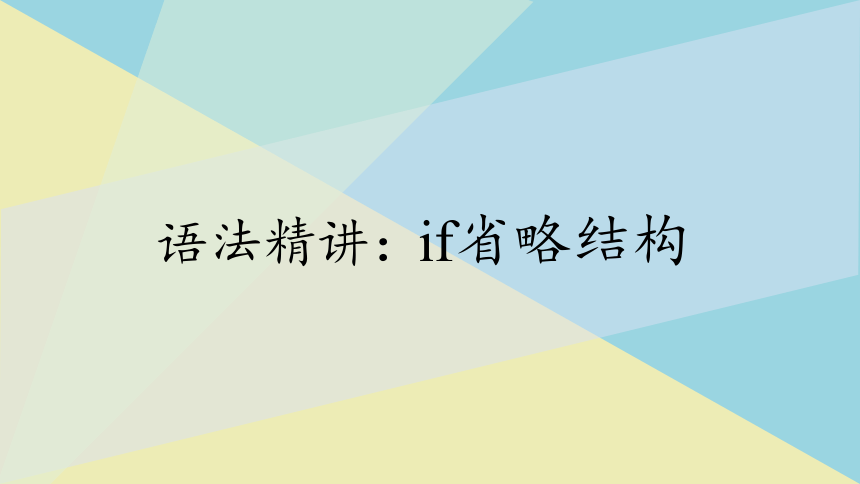 | |
| 格式 | pptx | ||
| 文件大小 | 8.1MB | ||
| 资源类型 | 教案 | ||
| 版本资源 | 人教版(2019) | ||
| 科目 | 英语 | ||
| 更新时间 | 2023-03-10 18:13:18 | ||
图片预览

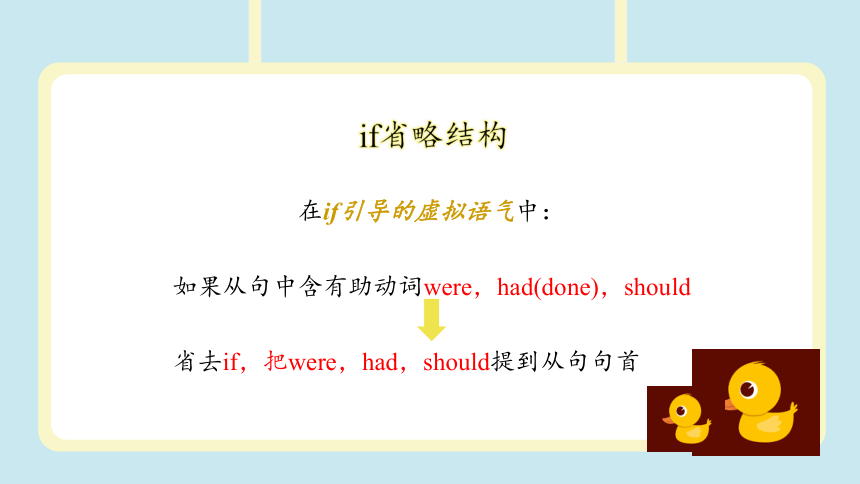
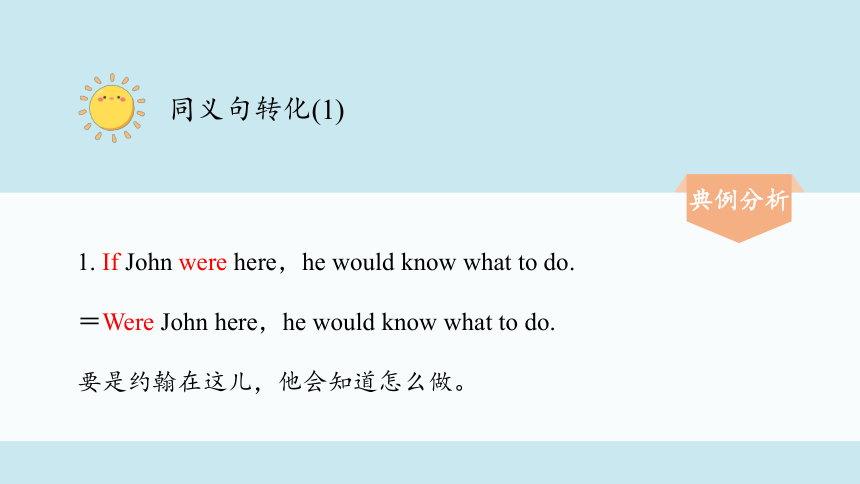
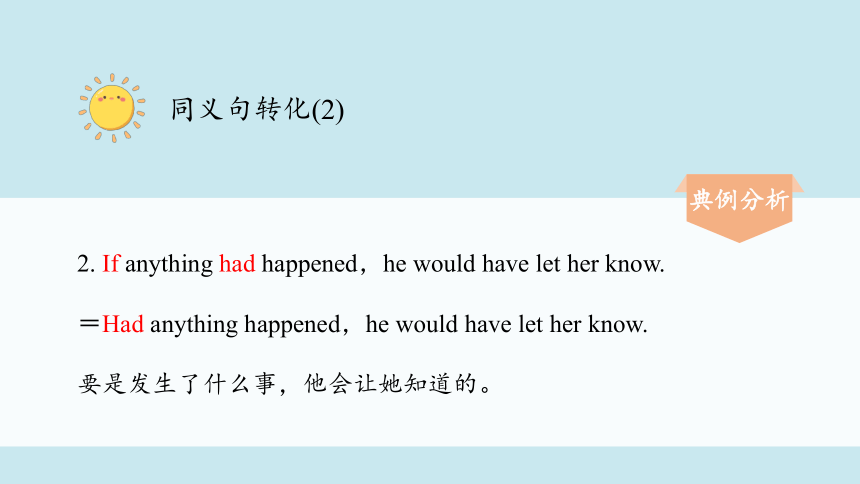
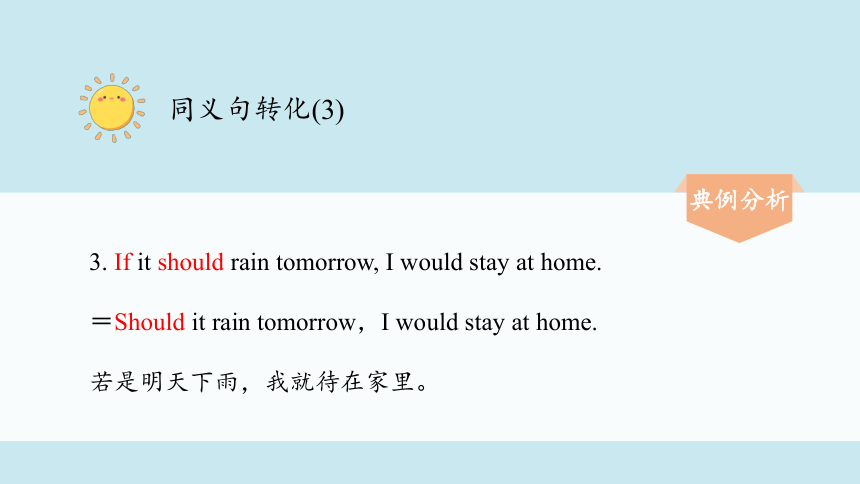
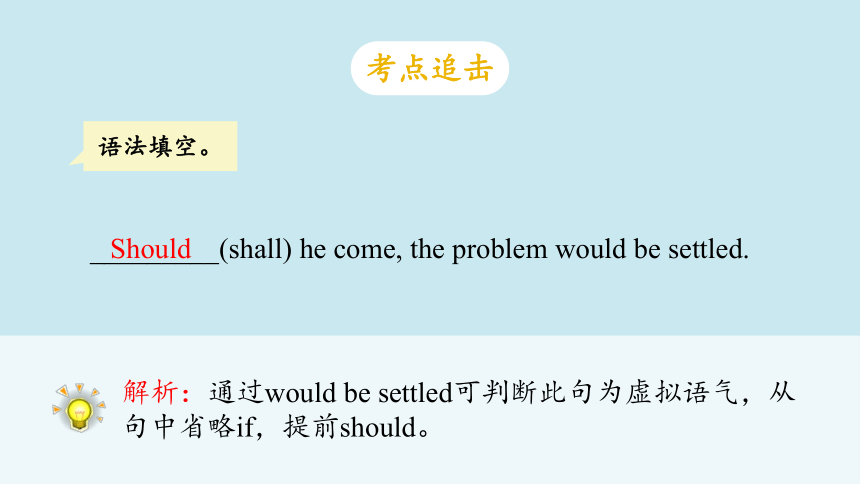

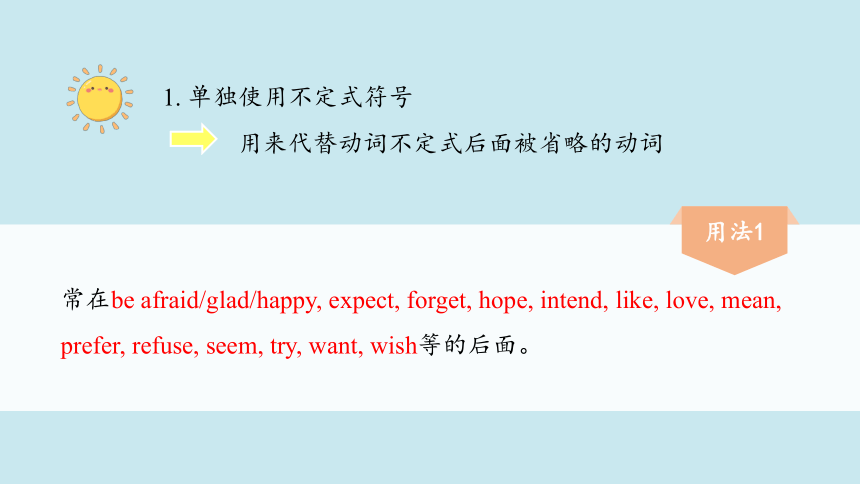
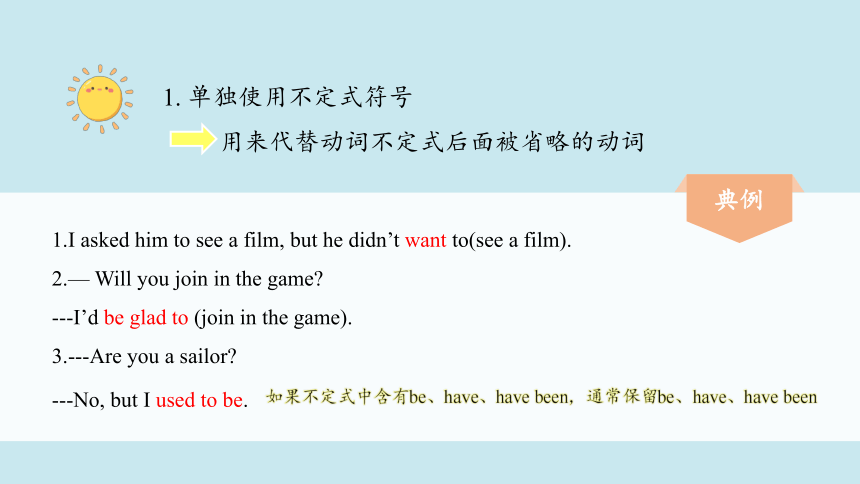
文档简介
(共21张PPT)
if省略结构
语法精讲:
if省略结构
在if引导的虚拟语气中:
如果从句中含有助动词were,had(done),should
省去if,把were,had,should提到从句句首
典例分析
1. If John were here,he would know what to do.
=Were John here,he would know what to do.
要是约翰在这儿,他会知道怎么做。
同义句转化(1)
典例分析
2. If anything had happened,he would have let her know.
=Had anything happened,he would have let her know.
要是发生了什么事,他会让她知道的。
同义句转化(2)
典例分析
3. If it should rain tomorrow, I would stay at home.
=Should it rain tomorrow,I would stay at home.
若是明天下雨,我就待在家里。
同义句转化(3)
_________(shall) he come, the problem would be settled.
解析:通过would be settled可判断此句为虚拟语气,从句中省略if,提前should。
语法填空。
考点追击
Should
不定式的省略
语法精讲:
用法1
常在be afraid/glad/happy, expect, forget, hope, intend, like, love, mean, prefer, refuse, seem, try, want, wish等的后面。
1. 单独使用不定式符号
用来代替动词不定式后面被省略的动词
典例
1.I asked him to see a film, but he didn’t want to(see a film).
2.— Will you join in the game
---I’d be glad to (join in the game).
3.---Are you a sailor
---No, but I used to be.
如果不定式中含有be、have、have been,通常保留be、have、have been
1. 单独使用不定式符号
用来代替动词不定式后面被省略的动词
用法2
(1)当主语部分含有动词do的某种形式时,做表语的动词不定式可省略to。
例:The only thing you have to do is (to)press the button.
2.省略不定式符号to的情况(1)
用法3
(2)不定式作介词but、except的宾语,前面有实义动词do的某种形式时,不定式常省略to。
例:Brian had nothing to do but (to)play computer games this afternoon.
2.省略不定式符号to的情况(2)
用法4
(3)当两个或两个以上的不定式并列时,后面的不定式符号to常省略,但表示对比关系时不省略。
例:I’m really puzzled what to think of and (to)express.
It is easier to make a plan than to carry it out.
3.省略不定式符号to的情况(3)
用法5
(4)在see、watch、hear、feel、observe、look at等感官动词及使役动词let、make、have后作宾语补足语的不定式不加to,但被动句中要加上to。
例:I saw him enter the building.
He is often seen to play basketball on the playground.
4.省略不定式符号to的情况(4)
The city now is much noiser than it used _______(be).
解析:省略不定式时,如果不定式中含有be、have、have been,通常保留be、have、have been.
语法填空。
考点追击
to be
状语从句中的省略
语法精讲:
可以省去从句的主语和be动词:
1.当从句的主语和主句的主语一致(或者从句的主语为it);
2.从句谓语中包含be动词。
状语从句中的省略
典例分析
1. Don’t speak until(you are )spoken to.
2. While( I was )walking alone in the street, I heard my name called.
(1)当从句的主语和主句的主语一致,且从句谓语中包含be动词,省去从句的主语和be动词。
被保留部分常为现在分词、过去分词、不定式、形容词
典例分析
1.I’ll buy a TV set if (it is)necessary.
2.Once (it is) begun,it must be done well.
(2)当从句的主语为it且从句谓语中包含be动词时,省去it和be动词。
常见短语
if so 如果这样的话 if not 若非如此
if ever 如果曾经有的话 if necessary 如果有必要的话
if possible 如果可能的话 if any 如果有的话
状语从句中的省略(3)
例:1. If necessary, ring me.
2. If possible, let me know beforehand.
When ______ (expose) to danger and conflict, men tend to increase blood pressure, feeling nervous or anxious.
解析:状语从句中符合省略的条件(主语一致,有be动词),故省略they are.
语法填空。
考点追击
exposed
Bye-bye!
if省略结构
语法精讲:
if省略结构
在if引导的虚拟语气中:
如果从句中含有助动词were,had(done),should
省去if,把were,had,should提到从句句首
典例分析
1. If John were here,he would know what to do.
=Were John here,he would know what to do.
要是约翰在这儿,他会知道怎么做。
同义句转化(1)
典例分析
2. If anything had happened,he would have let her know.
=Had anything happened,he would have let her know.
要是发生了什么事,他会让她知道的。
同义句转化(2)
典例分析
3. If it should rain tomorrow, I would stay at home.
=Should it rain tomorrow,I would stay at home.
若是明天下雨,我就待在家里。
同义句转化(3)
_________(shall) he come, the problem would be settled.
解析:通过would be settled可判断此句为虚拟语气,从句中省略if,提前should。
语法填空。
考点追击
Should
不定式的省略
语法精讲:
用法1
常在be afraid/glad/happy, expect, forget, hope, intend, like, love, mean, prefer, refuse, seem, try, want, wish等的后面。
1. 单独使用不定式符号
用来代替动词不定式后面被省略的动词
典例
1.I asked him to see a film, but he didn’t want to(see a film).
2.— Will you join in the game
---I’d be glad to (join in the game).
3.---Are you a sailor
---No, but I used to be.
如果不定式中含有be、have、have been,通常保留be、have、have been
1. 单独使用不定式符号
用来代替动词不定式后面被省略的动词
用法2
(1)当主语部分含有动词do的某种形式时,做表语的动词不定式可省略to。
例:The only thing you have to do is (to)press the button.
2.省略不定式符号to的情况(1)
用法3
(2)不定式作介词but、except的宾语,前面有实义动词do的某种形式时,不定式常省略to。
例:Brian had nothing to do but (to)play computer games this afternoon.
2.省略不定式符号to的情况(2)
用法4
(3)当两个或两个以上的不定式并列时,后面的不定式符号to常省略,但表示对比关系时不省略。
例:I’m really puzzled what to think of and (to)express.
It is easier to make a plan than to carry it out.
3.省略不定式符号to的情况(3)
用法5
(4)在see、watch、hear、feel、observe、look at等感官动词及使役动词let、make、have后作宾语补足语的不定式不加to,但被动句中要加上to。
例:I saw him enter the building.
He is often seen to play basketball on the playground.
4.省略不定式符号to的情况(4)
The city now is much noiser than it used _______(be).
解析:省略不定式时,如果不定式中含有be、have、have been,通常保留be、have、have been.
语法填空。
考点追击
to be
状语从句中的省略
语法精讲:
可以省去从句的主语和be动词:
1.当从句的主语和主句的主语一致(或者从句的主语为it);
2.从句谓语中包含be动词。
状语从句中的省略
典例分析
1. Don’t speak until(you are )spoken to.
2. While( I was )walking alone in the street, I heard my name called.
(1)当从句的主语和主句的主语一致,且从句谓语中包含be动词,省去从句的主语和be动词。
被保留部分常为现在分词、过去分词、不定式、形容词
典例分析
1.I’ll buy a TV set if (it is)necessary.
2.Once (it is) begun,it must be done well.
(2)当从句的主语为it且从句谓语中包含be动词时,省去it和be动词。
常见短语
if so 如果这样的话 if not 若非如此
if ever 如果曾经有的话 if necessary 如果有必要的话
if possible 如果可能的话 if any 如果有的话
状语从句中的省略(3)
例:1. If necessary, ring me.
2. If possible, let me know beforehand.
When ______ (expose) to danger and conflict, men tend to increase blood pressure, feeling nervous or anxious.
解析:状语从句中符合省略的条件(主语一致,有be动词),故省略they are.
语法填空。
考点追击
exposed
Bye-bye!
